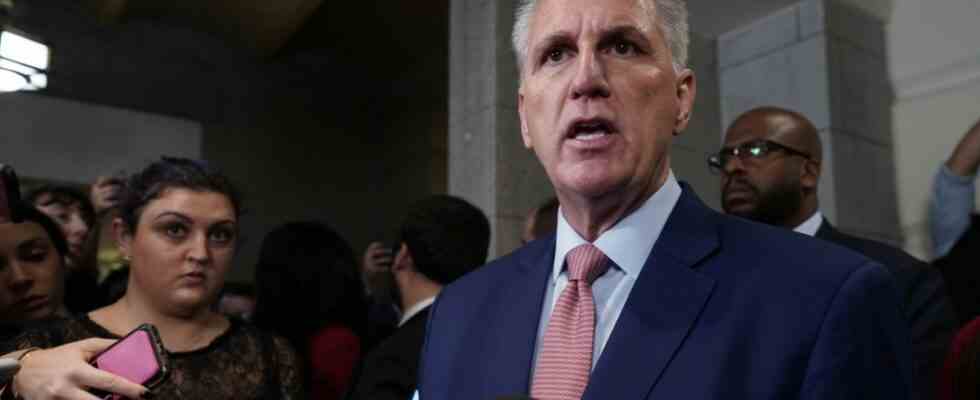Historic defeat in Washington: Republican Kevin McCarthy failed to be elected Speaker of the US House of Representatives in his first attempt. A second and third attempt also failed. Eventually the meeting was adjourned. The last time it happened was a hundred years ago that the vote for the powerful office required more than one ballot and a parliamentary group refused to support its candidate in the first round.
The election of the chairman is the first major act of a newly elected House of Representatives. And until the presidency is clarified, nothing works: the Congress Chamber cannot start its work, not even the new MPs can be sworn in. McCarthy only got 203 of 434 votes cast in the first round – he would have needed 218. 19 party colleagues refused to vote for him.
The second round of voting started right after the first. This once again showed the inner turmoil of the Republican faction. Rep. Jim Jordan re-nominated McCarthy and urged his fellow party members to close ranks. One of McCarthy’s toughest opponents, MP Matt Gaetz, in turn nominated Jordan and emphasized that it might be better to choose someone who does not want the post so desperately. In the short nomination speech for McCarthy, Jordan already showed more visions for the future than had ever been heard from him. Jordan then got 19 votes, and finally 20 in the third round.
One of the Republican rebels is Chip Roy from Texas. He told CNN that he was voting against McCarthy because the house “must work differently.” Roy is therefore bothered by the fact that votes on expenses are often tied together. For example, he would have liked to have voted separately on US aid to Ukraine, but this was linked to a major budget law.
The Republicans had seized control of the chamber in the election – in the Senate, President Joe Biden’s Democrats still have a narrow majority. The post of Speaker of the House of Representatives, which has been occupied by Democrat Nancy Pelosi in recent years, is third in the national ranking after the President and Vice President.
The record is 133 ballots
Several party colleagues rebelled against McCarthy in advance and had already announced before the vote that they would not support him. In view of the narrow majority, it was therefore indicated that McCarthy could miss the necessary majority in the first ballot.
McCarthy was combative just before the session, saying, “I hold the record for the longest speech in plenary.” He has no problem setting a record for the most ballots in a vote for the presidency of the House of Representatives. The record is 133 votes and dates from 1856.
Each ballot is lengthy because all MPs are called up individually to nominate their preferred candidate. Even if McCarthy prevails in the end, he will emerge weakened from the tussle and will face some difficulties organizing majorities in the Congress Chamber for years to come.
After weeks of talks with his opponents behind closed doors, McCarthy, visibly annoyed, went on the offensive ahead of the first ballot, publicly attacking his critics. They are all about personal advancement, not the country, McCarthy said.
Long attempts at reconciliation
The 57-year-old tried for a long time in internal negotiations with all sorts of concessions to change his critics’ minds. McCarthy revealed that on Monday he was told that he would only get the necessary votes if he provided certain members of the group with certain offices and budgets. One of his opponents, Republican Congressman Matt Gaetz, even said bluntly that he didn’t care if the Democratic candidate won the election, McCarthy said.
His critics are not concerned with America, but only with themselves, he lamented. “I will always fight to put the American people first – not a few individuals trying to get their own way.” There may therefore be a “battle” in the chamber’s plenary session, but it’s about the whole group and the country, “and that’s okay with me,” he said.
Behind the McCarthy dispute are fundamental Republican disputes over future course and leadership. The party is torn between right-wing supporters of ex-President Donald Trump and more moderate party members. This is particularly true for the faction in the House of Representatives.

